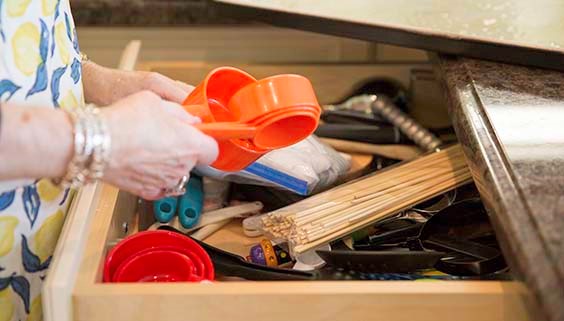Someone with Alzheimer’s disease may start rummaging or searching through cabinets, drawers, closets, the refrigerator, and other places where things are stored. He or she also may hide items around the house. This behavior can be annoying or even dangerous for the caregiver or family members. If you get angry, try to remember that this behavior is part of the disease.

In some cases, there might be a logical reason for this behavior. For instance, the person may be looking for something specific, although he or she may not be able to tell you what it is. He or she may be hungry or bored. Try to understand what is causing the behavior so you can fit your response to the cause.
Rummaging—with safety
You can take steps that allow the person with Alzheimer’s to rummage while protecting your belongings and keeping the person safe. Try these tips:
- Lock up dangerous or toxic products, or place them out of the person’s sight and reach.
- Remove spoiled food from the refrigerator and cabinets. Someone with Alzheimer’s may look for snacks but lack the judgment or sense of taste to stay away from spoiled foods.
- Remove valuable items that could be misplaced or hidden by the person, like important papers, checkbooks, charge cards, jewelry, cell phones, and keys.
People with Alzheimer’s often hide, lose, or throw away mail. If this is a serious problem, consider getting a post office box. If you have a yard with a fence and a locked gate, place your mailbox outside the gate.
You also can create a special place where the person with Alzheimer’s can rummage freely or sort things. This could be a chest of drawers, a bag of objects, or a basket of clothing to fold or unfold. Give him or her a personal box, chest, or cupboard to store special objects. You may have to remind the person where to find his or her personal storage place.
More tips for dealing with rummaging and hiding behavior
Here are some more suggestions:
- Keep the person with Alzheimer’s from going into unused rooms. This limits his or her rummaging through and hiding things.
- Search the house to learn where the person often hides things. Once you find these places, check them often, out of sight of the person.
- Keep all trash cans covered or out of sight. People with Alzheimer’s may not remember the purpose of the container or may rummage through it.
- Check trash containers before you empty them, in case something has been hidden there or thrown away by accident.
For more information on how to improve the safety of a home for someone with Alzheimer’s disease, visit the Home Safety Checklist for Alzheimer’s Disease.
Read about this topic in Spanish. Lea sobre este tema en español.
For more information about Alzheimer’s and rummaging and hiding things
NIA Alzheimer’s and Related Dementias Education and Referral (ADEAR) Center
1-800-438-4380 (toll-free)
adear@nia.nih.gov
www.nia.nih.gov/alzheimers
The National Institute on Aging’s ADEAR Center offers information and free print publications about Alzheimer’s disease and related dementias for families, caregivers, and health professionals. ADEAR Center staff answer telephone, email, and written requests and make referrals to local and national resources.
Family Caregiver Alliance
1-800-445-8106 (toll-free)
info@caregiver.org
www.caregiver.org
South Mountain Memory Care focuses on high-quality, personalized care, and the safest possible environment for your loved one. South Mountain Memory Care is proud to offer our residents a wide range of resident-focused daily activity programming. Each neighborhood offers activity space for group and one-on-one activities.
The brand-new building is a stand-alone memory care community, meaning that the entire building, staff, and programs, are designed to serve residents with cognitive issues. To ensure person-centered care and attention, we have accommodations for up to 28 residents. The building is divided into two neighborhoods (wings), each offering 10 private suites and 2 semi-private suites. South Mountain Memory Care is located in the Allentown suburb of Emmaus, Pennsylvania, and is easily accessible from the Lehigh Valley, New Jersey, and Philadelphia. For more information, go to southmountainmemorycare.com.
